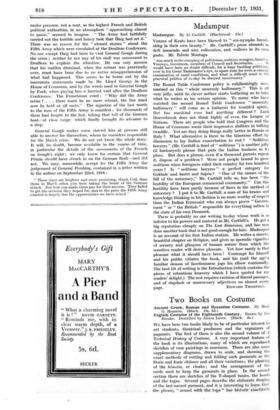Madampur
VERSES of Keats have been likened to " sea-nymphs luxuri- ating in their own beauty." Mr. Carthill's prose abounds in deft innuendo and nice collocation, and wallows in its own gusto. Mr. Edwin Montagu " was much inthe company of politicians, sedition-mongers, fanatim Viceroys, Governors, members of Council and Secretaries. . . . It would have been no doubt difficult, for a busy bustling politician. ever in his Great Taskmaster's eye, to spare time for even a cursory examination of rural conditions, and what is difficult must in the practical politics of to-day be deemed unnecessary."
The Round Table Conference policy is exhilaratingly sum- marized as this " whole unseemly buffoonery." This is all very jolly, until its clever author starts bothering us to take what he writes as his serious opinion. To many who have watched the second Round Table Conference " unseemly buffoonery " will come as a katharsis for troubled spirits. But has mankind ever had anything different ? Lord Beaverbrook does not think highly of even the League of Nations. There are people who hold that Congress and the House of Commons waste their impressive abilities in talking
twaddle. Yet are they doing things really better in Russia or Italy ? What alternative is there to the laborious effort by discussion to lay Indian exacerbation to rest ? " Seditious lawyers " (Mr. Carthill is fond of seditious ") is another jolly (if hackneyed) phrase that puts the Indian business in its place. But does a phrase, even if a thousand parrots repeat it, dispose of a problem ? Were not people bound to grow seditious when foreigners ruled their country for two hundred years ? Is " seditious lawyers " a perfect category for Gokhale and Sastri and Sapru ? "One of the causes of the fall of the autocracy," Mr. Carthill tells us, has been " the hostility of the European commercial community." Can this hostility have been partly because of flaws in the method of autocracy ? I put it to Mr. Carthill, a man of his brains and knowledge thinking in his fashion is no more worthy of respect than the Indian Extremist who can always prove " Govern- ment " or " the British " responsible for everything rotten in
the state of his own Denmark.
There is probably no one writing to-day whose work is so inferior to his powers and material as Mr. Carthill's. He got a big reputation cheaply on The Lost Dominion, and has now done another book that is not good enough for him. Madampur is an account of his first Indian station. He writes a sincere, beautiful chapter on Religion, and gives us sporadic vignettes of scenery and glimpses of human nature from which the sensitive reader will derive pleasure. Yet how rarely is that pleasure what it should have been ! Contempt for himself and his public vitiates the book, and his (and the age's) familiar demon of facetiousness jogs his elbow continually. The best bit of writing is the Introduction (which contains the pieces of robustious knavery which I have quoted for my readers' delight.) The rest requires excision of flaccid passages, and of slapdash or unnecessary adjectives on almost every










































 Previous page
Previous page